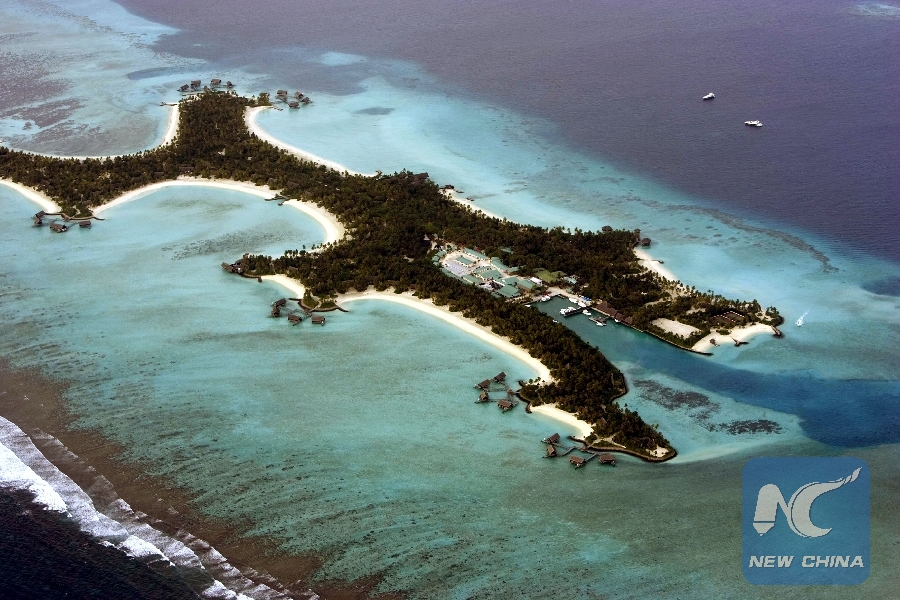
The aerial photo taken on Sept. 8, 2009 shows an island of Maldives. (Xinhua/Chen Zhanjie)
UNITED NATIONS, Jan. 25 (Xinhua) -- "Climate change is destroying our tiny island country for years," Abdulla Shahid, minister of foreign affairs of the Maldives, on Friday told a United Nations Security Council meeting on climate.
Addressing the Security Council's open debate on the impacts of climate-related disasters on international peace and security, Shahid said climate change is "eroding our beaches, killing the coral reefs protecting our islands and contaminating our fresh water with sea water."
"We are losing our fish stock. But most importantly, climate change is going to take our home away from us entirely," he warned.
At least 75 Security Council and other member states participated in the meeting, 13 of them at ministerial level.
Climate change has gained some traction in the Security Council's work over the past two years.
The Maldivian foreign minister told the Security Council that on April 17, 2007, when the Security Council held its first-ever debate on the impact of climate change on peace and security, he spoke on this very same matter.
He reminded the Security Council on that day that "climate change is not only an everyday fact of life for the Maldivians, but an existential threat."
"I reminded the Council that a mean sea-level rise of two meters would suffice to virtually submerge the entire Maldives under water. That would indeed be the death of a nation," he said.
"And yet, today, in this Council, 12 years later, I am still repeating the same message," the minister said emotionally.
"Prospects for our future are far worse than we ever imagined," he said, noting that "while we are still busy trying to decide which forum of the United Nations must address which aspect of climate change, our lakes are drying up, depriving fresh water to tens of millions of people."
"Unseasonal draughts are leaving millions of people homeless. Hunger and displacement are leading to conflicts, and entire nations are sinking under water," he continued.
"What is a bigger security threat to us than this?" the minister asked.
Noting that he was "encouraged" by the Paris Agreement with the aim to combat climate change and to accelerate and intensify the actions and investments needed for it, Shahid said he hopes that the Katowice Rulebook "will help improve our collective ambition to deliver on our pledges and keep global warming to well below 2 degrees Celsius above pre-industrial levels, 1.5 degree Celsius if possible."
"But for the Maldives, waiting and hoping is not enough. We must drastically reverse the current trends in climate change to ensure the future exists for little girls like Aisha and her friends."
Aisha is a five-year-old girl whom Shahid met at the Male International Airport as he left for New York. The girl asked him where he was going and Shahid told her that he was traveling to New York to speak at the Security Council about climate change.
"We had a little chat and she waved me goodbye with a huge smile on her face, holding onto her mother's hands, as I walked away to board my flight," he recalled.
"We need solutions," said Shahid.
"The countries that are on the first line of impact, such as the Maldives, cannot afford to wait," he noted.
"We cannot wait for climate change to force us to abandon our identity and lose our homes," he said.
"We need actions, actions that are consistent with the commitments we have already made. If we don't, we will extinguish the sparkle in the eyes of Aisha and millions of children like her," the minister concluded.

